Improve your English. Speak with confidence!
- Free Mini Course

- Posted in in ESL Conversation Questions

60 ESL conversation questions about education, school, and university
- Posted by by Cameron Smith
- May 13, 2023
Get everyone talking with these ESL conversation questions about education, school, and university.
Almost everyone in the world has had direct experience with education in some way, shape, or form. So get your students talking and sharing their experiences on the education system they experienced in their home country, and their take on the way other countries educate their populations.
ESL conversation questions about school
- Is the education system different in your country? How?
- Do you think that education is important for everyone?
- Should free education be a basic human right? Why or why not?
- What attributes does someone need to be a great teacher?
- Would you like to be a teacher? Why or why not?
- Do you think that teachers are paid enough for the work that they do? Why or why not?
- What improvements would you like to make to your country’s education system?
- What are some of the things that your country’s education system does better than any other country?
- Is education highly valued in your country? Why or why not?
- Are teachers respected in your country?
- Is it common for students to graduate from high school in your country?
- Is it a legal requirement for children to attend school in your country?
- Is education completely free in your country?
- Does your country offer high quality education to all students? Why or why not?
- What would the world look like without education?
- Which country is doing the best job at educating its population?
- Are there any disadvantages to attending university, versus getting real-world training?
- Has education changed since you were young?
- How do you think education will evolve in the years to come?
- How will AI change education in the near and distant future?
- Did you enjoy going to school?
- Did you prefer primary school or high school? Why?
- What were your favorite subjects in high school?
- What were your least favorite subjects in high school?
- Who was your favorite teacher in school? What made them such a great educator, in your opinion?
- What is your favorite memory from school?
- What is your least favorite memory from school?
- When you were younger, what did you want to be when you grew up? Did that goal change by the time you graduated from high school?
- Do you prefer to study with books or a computer?
- Did you enjoy doing your homework?
- Do you think that homework is important for students? Why or why not?
- What improvements could we make to the education system?
- If you could go back to school and do it all over again, what would you do differently this time?
- Did you ever go on any school trips? Describe them.
- What sports did you excel at during your school years?
- What extracurricular activities did you participate in during your school years?
- Did you ever win any awards at school?
- What is a typical school lunch in your country? Describe it.
- At what age do children start to attend school in your country?
- How old are students when they graduate from high school in your country?
ESL conversation questions about university
- What are you studying / What will you study at university?
- Is university free in your country?
- Do you think that university is too expensive?
- Do you think that secondary education should be provided free to all citizens? Why or why not?
- Does your future career require a university degree?
- If you have graduated, are you still using the knowledge that you learned at university?
- How can students balance their university commitments with other life commitments (e.g. a job)?
- What are some of the challenges that students deal with in secondary or tertiary education?
- Do you think that every career should require a university degree?
- Do you think that someone can learn more from practical on-the-job experience versus a university degree? Why or why not?
- How has online learning impacted universities?
- Do you think that in-person education is more effective than online or remote education?
- Do you prefer studying alone or in a group?
- Do you enjoy participating in clubs, organizations, or extracurrucular activities at your university?
- Do you think that networking is important for students while they are at university? Why or why not?
- What are some of the advantages of obtaining a university degree?
- What are some of the downsides of obtaining a university degree?
- What is your best advice for someone who is about to attend university?
- Do you think that everyone should attend university? Why or why not?
- What are some of the differences between secondary education (high school) and tertiary education (university)?
Subscribe to our newsletter for more free ESL learning resources!
Cameron Smith
I'm an English Communication Coach based in Vancouver, Canada. I'm on a mission to help millions of people speak English with confidence. Thanks for visiting this site! If you want longer video content, please follow me on YouTube for fun English lessons and helpful learning resources!
Post navigation

- Posted in in Reviews
The Best Books to Learn English in 2023
- May 12, 2023

The Best ESL Books for Teachers: 13 Must-Read Resources
- May 15, 2023
Leave a Reply Cancel reply
Your email address will not be published. Required fields are marked *
Save my name, email, and website in this browser for the next time I comment.
You are using an outdated browser. Please upgrade your browser or activate Google Chrome Frame to improve your experience.
29 ESL Conversation Topics Adult Students Really Enjoy
One key goal almost every adult ESL student shares is gaining the ability to speak English with others.
What better way to learn to speak English than to speak about the very same things that you speak about on a daily basis ?
ESL speaking activities work even better when someone speaks about their own personal recollections, thoughts and ideas on these topics.
Use these topics and questions to get conversations started!
8. Television
11. first dates, 13. motivation, 19. restaurants, 20. cooking, 22. shopping, 26. learning, 28. computers, 29. problems.
Download: This blog post is available as a convenient and portable PDF that you can take anywhere. Click here to get a copy. (Download)
Everybody has hobbies, and everybody loves talking about them. Hobbies could be passions too, you know. Some simple questions to ask include:
- What are your hobbies?
- Why do you like your hobbies so much?
- How often do you do these hobbies?
- How long have you been doing these hobbies, and how did you get started?
- What hobbies did you used to have, but now do not?
- Is it important to have hobbies? Why/why not?
Lots of people work and have lots to say about it. I mean, if you’re spending about a third of your waking hours at work, you may have lots to say.
Some good questions are:
- What work do/did you do?
- Do/did like your job? Why or why not?
- What is your dream job?
- What work is common in your city/area/country?
- What is your general view about work? Why?
Food is possibly the most universal topic of them all and everyone loves to discuss what they eat. Food-themed ESL activities are always a hit with students.
This is also an ideal topic for beginners because the vocabulary is usually pretty simple. You could use questions like:
- What is your favorite food? Why?
- What food do you eat a lot?
- What food comes from your country?
- How do you feel when you eat food?
- What foods do you dislike? Why?
- Where do you usually get food from?
This is a topic that many people get very excited about. If someone is passionate or emotional about a topic, they can be more motivated to speak and understand things related to it.
A few good example questions are:
- Do you like sports? Why/why not?
- How often do you exercise/play sports?
- Did you play any sports as a child?
- What sport/physical activity is popular in your country?
- What is your opinion on professional sports?
As people get older, their perceived value of time increases, so it’s a practical topic that everyone has something to say about.
You could ask questions like:
- How much free time do you usually have?
- How important is time to you?
- If you had more free time, what would you do?
- “Time is money.” Do you agree or disagree? Why?
- How do you feel about time that is wasted?
As people get older, they start to appreciate a good night’s sleep more and more. This topic is often a favorite.
Some example questions are:
- How much sleep do you usually get?
- Why do some people sleep well while other people do not sleep well?
- What do you do when you have trouble sleeping?
- What time do you usually go to sleep? What time do you usually get up?
- Have you ever slept in a strange place that was not a bed?
Everybody loves music and most people feel very strong emotions toward it—especially when it comes to the music that they love (or hate) most. Some simple questions to ask could be:
- What types of music do you like/dislike?
- How do certain kinds of music make you feel?
- What types of music come from your country?
- What’s your favorite song/album/artist?
- What music is popular in your country right now?
Listening to music with English lyrics can be fun and engaging activity that can also start conversations.
Watching music videos with subtitles will help students remember the vocabulary they hear in a song.
Television is one of those topics that everyone has an opinion about.
TV will enable you to showcase native English forms and provide some great context before diving into discussion questions. Good questions include:
- How often do you watch TV?
- Should everyone have a television in their home?
- What is the best way to watch television: On a television set, computer, tablet or phone?
- What television programs are popular in your country?
- What do you think will be the future of television?
- What is your opinion on television?
- If you had your own TV show, what would it be like?

If your students enjoy learning from TV and other native content, you can try a media-focused resource like FluentU .
This website and app teaches English with authentic videos, including clips from TV shows, news segments and commercials.

The video dictionary also links to other videos that use the word for additional context. Students can also take quizzes based on the videos and their flashcard learning.
The pop-culture content on FluentU is more interesting to students than more traditional materials, and it increases the motivation to understand the dialogue.
Authentic media lets students hear English the way native speakers use it and helps them recall the meanings of words better by creating memorable associations with stories and characters.
The FluentU program is available both for schools and for individual learners .
Like television, movies are a popular conversation topic. I mean, who doesn’t watch movies? A few good questions to be asked could be:
- What was the last movie you saw? How was it?
- What is your favorite movie? Why?
- How are the movies in your country? What are the best ones?
- How often do you watch movies in English?
- If there were a movie about your life, what kind of movie would it be? Why?
Travel can be a great discussion topic – it encourages storytelling in the past tense and inspires students to talk about culture and similar topics.
Here are some possible questions:
- Where have you traveled?
- What countries have you been to?
- Where would you like to travel to in the future?
- When you travel, what safety precautions do you take?
- Do you like to prepare a lot before you travel, or just wing it?
- What are some cultural issues that you have experienced while traveling? Do you have any funny or embarrassing stories?
Talking about first dates gets everybody interested. We’ve all been there.
- How many first dates have you had?
- How do you feel about first dates?
- What is a common first date like in your country?
- What is the best/worst first date experience you’ve ever had?
- What makes a good first date in your opinion?
Everyone feels a certain way about risk. Some are risk-oriented, others are risk-averse. Talking about risks seems to generate some good conversation. You could ask questions like:
- What is your definition of risk?
- Are you a risk taker? Why/why not?
- What are the advantages/disadvantages of taking risks?
- What risks do you come across in your work/life?
- What risks have you taken in your life?
Whether or not the students are a motivated bunch, motivation is a good topic to discuss in order to inspire your students.
- How motivated are you in general?
- What motivates you to do things?
- What is the best motivator to succeed?
- What do you do when you feel unmotivated?
- What is a good way to motivate others?
Anyone can appreciate beauty in all its forms, and anyone can recognize the importance of the concept of beauty in our cultures, societies and behaviors.
This makes it a good topic to discuss to get some opinions and various views within a group.
- What is “beauty”?
- What/who do you consider beautiful?
- What does “inner beauty” mean to you?
- Do you consider artificial beauty (cosmetic surgery) to still be beauty? Why/why not?
- How do you feel about the emphasis that people put on beauty these days?
- What would you tell your children about beauty?
Crime may not be on the top of people’s lists of favorite topics but it’s something that’s talked about.
Depending on someone’s life experiences, it may be something that has affected their lives. Learning to discuss it could help in the long run.
Good discussion questions are:
- Is crime a big problem in your city/country?
- Have you ever been a victim of crime?
- What crime is common in your city/country?
- What would you do if you noticed a crime being committed?
- How is the law enforcement in your city/country?
Most people have had some firsthand experience with love that they’d like to talk about. It’s another one of those universal topics that gets the conversation going.
Even if it’s not about romantic love and heartbreak, students can talk about familial love with their parents and children, as well as love between friends.
Questions like these are good:
- What is love?
- Who/what do you love?
- What good/bad experiences have you had with love?
- Can you be too young to be in love? Why/why not?
- How do you feel about love?
We all have goals and talking about them actually gets us more encouraged to do something about them. Sharing goals is also a good way to help get them achieved.
A good set of questions is:
- What are your current goals in life?
- How do you plan to reach your goals?
- How often do you set goals for yourself?
- What goals have you set and achieved in the past?
- How do you feel when you reach your goals?
We all have dreams, sometimes on a nightly basis, and they can make for a great discussion topic as it inspires students to be creative and even whimsical.
Great questions for this topic include:
- What kinds of dreams do you have?
- What do you think dreams mean?
- How much of your dreams do you remember? Why?
- What is your opinion on premonitions? Are they real?
- What are examples of memorable dreams you have had?
Along with eating, people love talking about their favorite eateries and restaurants. Some students might even relate to each other with their choices and views.
Good questions include:
- How often do you go to restaurants?
- What is your favorite restaurant? Why?
- What do you usually order at a restaurant?
- What is the restaurant experience like in your country?
- Have you ever worked in a restaurant?
- If you owned a restaurant, what kinds of food would you serve?
Cooking is another topic that may allow for some good conversation. Most people in most countries do a good amount of cooking.
A few good questions could be:
- In your home, who usually cooks?
- How often do you cook?
- How well do you cook? What can you cook well?
- What are the advantages/disadvantages of cooking?
- What food would you like to learn how to cook?
Recipes can be a fun way to introduce students to assorted cooking vocabulary and phrases. And in addition to written recipes, there are tons of recipe videos on the web if you want to work on listening comprehension as well.
FluentU has lots of videos about food and cuisine, as well as several captioned recipe videos.

If there is one topic that affects everyone, it has to be money. People love talking about money.
Well, they may not if they’re broke—but even then it’s a relatable topic that gets conversations going.
Great questions include:
- How well do you manage your money?
- Why do some people have money problems?
- What are some good ways to make money?
- What would you do if I gave you $20/$2,000/$2,000,000?
- How often do you save money? Why?
This one is a personal favorite for many. Shopping just brings out the zest in some people.
Others feel strongly the other way—very few people are completely neutral on this topic.
A few good questions are:
- Do you enjoy shopping? Why/why not?
- What is your favorite shop? Why?
- In your city, where is a good place to go shopping?
- How do you feel about online shopping?
- What do you think shopping will be like in the future?
Everybody makes plans and discussing them could even influence the class to start making plans of their own! A few example questions include:
- How often do you plan things? Why?
- What are your plans for (________)?
- What are your plans for your English?
- What do you think of this quote? “Having no plan is a plan to fail.”
- Do you have any back-up plans?
Books make for a good conversation topic because most people enjoy a good book.
When you read, your mind is filled with new images, feelings, ideas and thoughts. It can be immensely satisfying for someone to share how they feel about reading.
Some questions to ask are:
- Do you like books/reading? Why/why not?
- What kind of books do/did you like?
- What is your favorite book? Why?
- What was the last book you read?
- Do you believe reading books/literature is more important than reading stuff online? Why/why not?
Life discussions go on in all languages and English is no exception.
Life is a good topic since everyone has their own views and thoughts on this universal subject.
You could bring up questions like:
- What is the meaning of life?
- How is your life going up to this point?
- What do you think happens after death?
- What important life lessons have you learned?
- If tomorrow was your last day to live, what would you do?
Learning is like nature—it’s all around us, even on a subconscious level. Our brains are built to absorb, filter and store information.
A conversation about learning could actually stimulate some English learning!
A few questions that are suitable are:
- How important is learning? Why?
- Besides English, what are you currently learning?
- What things are you good/bad at learning? Why?
- What would you most like to learn?
- What is the most difficult part of learning? Why?
Games are fun and everybody enjoys fun, no?
But in all seriousness, talking about games tends to gear the conversation more toward past tense, which can bring students a fond sense of nostalgia.
Some simple questions could be:
- What is your favorite game ever?
- What games did you play as a kid?
- What games are popular/came from your country?
- How competitive are you when it comes to games?
- What games do you still play now? Why?
It’s hard to go a day without talking about computers. This universal topic could have students discussing quite a few things, much of which could relate to real life too!
Great questions on this could be:
- Describe your computer at home/work.
- What do you usually use a computer for?
- Do you like computers? Why/why not?
- What was the first computer you ever had like?
- What do you think will be the future of computers?
Even though nobody likes to talk about problems per se, everybody still talks about their problems to other people!
Problems are actually a good topic for discussion since they could help others relate to each other and even present solutions too.
A few fine examples of questions are:
- How do you deal with your problems?
- What problems do you come across in your work or life?
- Do you feel that problems are opportunities? Why or why not?
- What was the last problem you solved and how did you do it?
- “Problems don’t matter. Solutions do.” Do you agree or disagree?
Discussion questions like the ones above—questions about everyday things—work well because they really get the brain thinking.
These topics relate directly to students on a familiar level and can even spark some fascinating discussions.
You could even mix up the example questions any way you’d like.
These topics may even inspire you to come up with some of your own, as you begin to understand what works and what doesn’t.
Happy discussing!
For more tips, check out this post next:
Wondering how to teach ESL to adults? While your lessons might be a bit less chaotic than with younger students, they don’t have to be dull or boring. Everyone enjoys…
Enter your e-mail address to get your free PDF!
We hate SPAM and promise to keep your email address safe

Welcome to esl DiscussionTopics
Welcome to esl discussion topics.
Quality questions you can use in the ESL classroom to get your students talking
Discussion questions on general topics suitable for the ESL classroom.
Business English discussion questions for those studying English for specific purposes.
Discussion questions designed to practice grammar in the ESL classroom.
PDF Formats
All handouts available for download in a variety of PDF formats.
General Topics
Business topics, grammar topics, how to use this site.
This site contains more than a thousand ESL discussion questions on a range of topics including general, grammar and business English discussion topics. These discussion questions are suitable for teachers to use in the ESL classroom with students at intermediate level or above. The ESL discussion questions are designed to be accessible to a general audience, but are open enough to allow advanced speakers to develop more complex responses.
Select a category above from either the general , grammar or business sections and click on the link. This will take you to a page where you can view the ESL discussion questions and download them in a variety of PDF formats perfect for the classroom. All the materials on this site are provided free of charge.
For further information about the site and its author, see the about page.

“I never let my schooling interfere with my education.” Mark Twain (1835 – 1910), American writer
- October 17, 2020
- General English
- No Comments
Home » Education
Latest lesson plans

LESSON OVERVIEW
This free ESL lesson plan on education has been designed for adults and young adults at an intermediate (B1/B2) to advanced (C1/C2) level and should last around 45 to 60 minutes for one student.
Education is one of the most important issues in any society. The level of education not only determines the future of children, but also plays an important role in determining the success of entire countries. In this ESL lesson plan on education, students will have the opportunity to talk about their own experiences at school and discuss and express their opinions on issues such as the standard of education in their country, the differences between private and public education and whether or not education should be considered a fundamental human right.
This lesson plan could also be used with your students to debate these issues for the International Day Of Education , which takes place in January. For more lesson plans on international days and important holidays, see the calendar of world days to plan your classes for these special occasions.
For advice on how to use this English lesson plan and other lesson plans on this site, see the guide for ESL teachers .
PRE-CLASS ACTIVITIES
Reading activity Before the English class, send the following article to the students and ask them to read it while making a list of any new vocabulary or phrases they find (explain any the students don’t understand in the class):
BBC | “Inequality ‘significantly’ curbs economic growth – OECD”
The article refers to research conducted by the OECD which found that inequality due to a lack of investment in education has a negative effect on economic growth. At the start of the class, hold a brief discussion about what the students thought about the article. What do they think about the issues raised in the article? Do they agree with what was written? Can they think of any ways they might disagree with the content of the article?
Video activity To save time in class for the conversation activities, the English teacher can ask the students to watch the video below and answer the listening questions in Section 3 of the lesson plan at home. There are intermediate listening questions and advanced listening questions so teachers can decide which would be more appropriate for their students. Check the answers in the class.
The video for this class is called “Who Is Allowed To Go To School” by UNESCO and explains the various obstacles many people around the world have which prevents them from receiving an education and what UNESCO’s role is in ensuring this fundamental human right to education.
IN-CLASS ACTIVITIES
The focus in the class is on conversation in order to help improve students’ fluency and confidence when speaking in English as well as boosting their vocabulary.
This lesson opens with a short discussion about the article the students read before the class. Next, the students can give their opinion on the quote at the beginning of the lesson plan – what they think the quote means and if they agree with it. This is followed by an initial discussion on the topic including their experience at school, their favourite subjects and the best qualities in a teacher.
After this, students will learn some vocabulary connected with education such as extra-curricular activities , play truant and flunk . This vocabulary has been chosen to boost the students’ knowledge of less common vocabulary that could be useful for preparing for English exams like IELTS or TOEFL. The vocabulary is accompanied by a cloze activity and a speaking activity to test the students’ comprehension of these words.
If the students didn’t watch the video before the class, they can watch it after the vocabulary section and answer the listening questions. Before checking the answers, ask the students to give a brief summary of the video and what they thought about the content.
Finally, there is a more in-depth conversation about education and society. In this speaking activity, students will talk about issues such as the standard of education in their country, any differences between private and public schools, and what they think about religious and single-sex schools.
After the class, students will write about their opinion of education in their country. This could be a short paragraph or a longer piece of writing depending on what level the student is at. The writing activity is designed to allow students to practise and improve their grammar with the feedback from their teacher. For students who intend to take an international English exam such as IELTS or TOEFL, there is an alternative essay question to practise their essay-writing skills.
DOWNLOAD LESSON PLANS

Did you find this lesson plan useful?
Your English Pal is a free resource to help fellow ESL teachers save time when preparing their classes. If these lesson plans have helped you, and you’d like to help keep the site free, please consider making a small contribution to help cover the site’s costs. Any help you can give is much appreciated!
Leave a Comment Cancel Reply
Your email address will not be published. Required fields are marked *
Save my name, email, and website in this browser for the next time I comment.
Copyright © 2023 Your English Pal
Privacy Overview

Intermediate
Esl conversation topics.
Discover thousands of questions on a variety of different conversation topics designed to encourage engaging discussions and help improve the speaking skills of English learners around the world.

Browse Conversation Topics By Level

Unlock the Power of Conversation
Discover a world of conversation possibilities with thousands of questions designed specifically for ESL teachers. With a wide range of topics, split into beginner , intermediate , and advanced levels , you're sure to find something that suits your needs.
Explore different ways to encourage discussion with your students while improving their overall ability including topics based on various subjects, grammar points , vocabulary , media and more. All our conversation topics and suitable for teens and adults.
Subscribe to our newsletter so you know whne we add any new and exciting to the site
Engage Adults and Teens with Dynamic Discussions
If you're looking for something a little different to add to your conversation classes, or if you want to just add a little fun and unpredictability, then our random conversation generator is the perfect add-on to any class.
Debates topics are also a great way to add some variety to your classes. Explore our list of over 250 debate topics or use our random debate topic generator . Want to make it even more interesting? Set the parameters and tell them if they have to argue for or against each topic regardless of their own personal views.

Check Out The Latest ESL Conversation Topics

Comparing Holiday Destinations
- Have you ever visited any one these places? If so, what were they like?
- Why do you think these destinations a popular with tourists?
- Which destination would you most like to visit?
- Which destination would you least like to visit?
- View More...

Rock climbing

Running a marathon

Choose A Sub-Topic

Entertainment

Environment

Food and Drink

Law and Order

Relationships

Spirituality

ESL Topics: Education
1.) Are you in school? Are you a student (both questions have the same meaning.)?
Yes, I'm currently enrolled at the University of Toronto.
2.) What is your best subject? What is your strongest subject? (both questions have the same meaning.)
When I was a high school student my strongest subject was science.
3.) What is your worst subject? What is your weakest subject? (both questions have the same meaning.)
When I was a high school student my weakest subject was French.
4.) What elementary school did you attend? What high school did you attend?
I went to St. Jerome Catholic elementary school. I attended St. Martins Catholic Secondary school.
5.) What university do you go to? Which university do you attend? (both questions have the same meaning.)
I go to the University of Toronto.
6.) Will you pursue a masters or a doctorate in your field?
I don't think the benefits of obtaining a masters or doctorate degree outweigh the costs and time associated with acquiring one.
7.) Did you attend an all boys / girls school? Or did you attend a co-ed school.
I always attended a school with both male and female students. So, I attended a co-ed school.
8.) Were you a member of any extracurricular activities? If so, which?
I was a member of the high school football and soccer team. I enjoyed athletics.
9.) Were you a good student? Were you a good student academically? (What's the difference between these two questions?)
I was a good student. However, I wasn't very good academically .
10.) Is your university renowned for any programs?
The University of Toronto is renowned for it's medical degree program. Some of the best doctors in Canada graduate from the University of Toronto.
11.) What's your major? What are you majoring in? (Both questions have the same meaning.)
I have a double major in political science and historical studies.
12.) Growing up, did you take part in (participate in) any after school activities?
I attended a math academy after school to boost my low grades in algebra.
13.) Were you ever bullied by your classmates? Were you ever a bully?
Luckily I wasn't bullied. I also never bullied anyone. I always stood up for people who were bullied.
Intermediate:
1.) Does your major have a high success rate for job placement ? (Is it easy to get a job after graduation?)
Actually, majoring in history and political science has a very low success rate for finding work following graduation.
2.) Did your major offer an internship program? If so, did you become an intern? Tell us about it.
No, my major didn't have an internship. In Canada, usually business majors and science majors have opportunities to become interns.
3.) Did you develop any lasting relationships with any teachers or professors over the years?
I didn't become very close with any teachers. However, I did develop a lasting relationship with one of my professors from university. We keep in contact and usually have lunch a few times a year.
4.) What led you to pursuing your major? Do you have any regrets with your decision?
It was the only program from the university of Toronto that would except me. I initially wanted to get a degree in business but my grades were insufficient .
5.) Do you prefer lecture based classes or hands on classes?
I prefer hands on classes. However, universities in Canada are mostly lecture based, where you sit in a lecture hall and just listen to the professor ramble on and on.
1.) Does your university, or government offer any assistance in job placement following graduation? If so, was it helpful?
Actually, the first two years following graduation, my university helps students with job placement. However, there are no guarantees!
2.) Do you have any credentials other than your degree that will assist you in finding work?
Yes, I have experience with programming and analyzing data, I am certified with Microsoft Office, and I have over 500 hours of volunteer work with my local hospital.
3.) What degrees are in high demand for jobs in your country?
Many jobs in the tech industry are in high demand. Specifically, jobs related to programming and telecommunications. However, the pay isn't that great.
4.) Will your salary be enough to support a family, or will it require your partner to also work ( duel income family )?
In Canada, new positions in almost all fields aren't enough to support a family with children on a single income. So duel income households have become a necessity to provide a high standard of living .
1.) Remember: "I major in _______." or " I'm a _____ major ." Don't say: " I'm ______ major ." So many students make this strange mistake.
2.) Remember: " I'm a Seoul National University student ." Or " I'm a student at Seoul National University." Don't say: " I'm Seoul National University." This is also a very common mistake among students. Remember, you are not a university; you are a student.
3.) Don't say: "I'm a fourth grade university student." This is incorrect. Instead, say : "I'm a fourth year university student." Grades are used for elementary, middle and high school, not university.
4.) When you take a test, you get a "score". All your test results combined make your overall "grade". Therefore, "I didn't score well on my last exam but my overall grade is good." Just remember your score is the number. For examples, I got 7/10. My score was "7". The grade is the letter. For example, since I got a 7/10 my grade is a C-.
Match the words from column 1 with the best-suited answer in column 2.
Answer the questions in full sentences using some of the key words you 've learned in this handout.
1.) Are you enrolled in any programs or classes?
2.) Did you attend a co-ed school growing up?
3.) What are some of your credentials?
4.) What's your biggest regret?
5.) Did you form many lasting relationships form your childhood?
6.) Do you prefer hands on classes, or lecture based classes?
7.) To support a family with a high standard of living, what month income is required?
8.) Is your profession in high demand? Was job placement difficult?
9.) What did you initially find appealing about your major?
10.) Would you consider going back to school if you lost your job? If so what would you major in?
11.) Did you attend a private or public school growing up?
Vocabulary:
- enrolled: To register for a class or program. "Half the staff at Apple will be enrolling in free Chinese classes."
- pursue: To go after. "I was told to pursue a degree in science due to the many job openings available."
- doctorate: The highest degree attainable; PhD. "I would love to get my doctorate in History and teach at the university level."
- acquire: To get; to possess. "My wife and I are trying to acquire a real-estate certificate in our spare time."
- co-ed: Males and females mixed together for school, or sports. "I'd love to play co-ed beach volleyball with Sarah."
- extracurricular: Something outside of your main course of career. "Music is a simple extracurricular course to enroll in to get an extra credit and make friends."
- academically: related to higher education. "She is amazing academically, but she is terrible socially."
- bullied: To be the victim or attacks, threats, or verbal abuse. Usually the poor, weak, and ugly are bullied. "I was bullied in middle school because of my abnormally big nose."
- stood/stand up for: "When someone helps someone who is weaker and needs help from a bully." "I was taught to stand up for myself, and to stand up for those in need."
- job placement: The process institutions (schools, government agencies, military) take to put you in the proper position for getting a job. "I would take the internship program because I heard they help you with the job placement process after the internship."
- lasting relationships: Relationships that continue outside of their initial place of origin (school, work, club). "I made many lasting relationships from my days in the military."
- regrets: Sadness because of a missed opportunity. "My biggest regret is not buying Apple shares when my friend told me to."
- initially: At first. "I was initially instructed by my doctor to lose weight just from diet before starting an exercise program."
- insufficient: Not enough. "My bank statement says I've got insufficient funds."
- "hands on": A class or program that teaches you by actually doing examples and experiments, instead of just listening. "I prefer colleges to universities because they are more hands on."
- ramble: To talk for a long time about something in a confusing way. "My dad can ramble on and on about World War II."
- credentials: Your qualifications and skills. "I need to get some more credentials in computers before I can apply for that position. "
- high demand: When something is in short supply. "Skilled technicians in mechanical engineering are in high demand."
- duel income family: When both partners work. "Duel income families were not so common 20 years ago, but times change."
- necessity: A requirement, a must. "Speaking English is a necessity for international flight attendants."
- high standard of living: When an individuals or families expections the best services and way of life provided for them. "Many Americans have a much higher standard of living compared to their neighbors, Mexicans, to the south."
Daily Expressions & Idioms:
1.) "sweating buckets": When someone is sweating a lot.
"I was sweating buckets during my job interview. He was asking my questions I just couldn't answer."
2.) "out of touch": When you do not understand the reality of the situation.
"He's really out of touch with reality if he thinks he will get the job with such poor credentials and English skills."
- Grades 6-12
- School Leaders
Get our FREE Mother's Day Printable 💐!
Every product is independently selected by (obsessive) editors. Things you buy through our links may earn us a commission.
What Is ESL? A Guide for Educators
Help all learners succeed.

Now more than ever, we have a responsibility to help students feel welcome in the classroom. Language is one of the ways we can do that. But we have to provide quality programs to make it happen. By offering ESL (English as a second language) or ELL (English language learner) support in schools, we can help non-native English speakers get the instruction they need to be successful. So, what is ESL exactly? And how can we ensure we are offering equal opportunities for learning? Read on as we define what ESL is and how to support ELLs in the classroom and beyond.
What is ESL?
Simply put, ESL comprises programs that teach English language skills to non-native speakers. ESL can also refer to a methodology or curriculum specifically designed to increase English language proficiency for ELLs. These programs include instruction in vocabulary and speaking as well as reading and writing.
Here’s a summary of important ESL concepts to know:
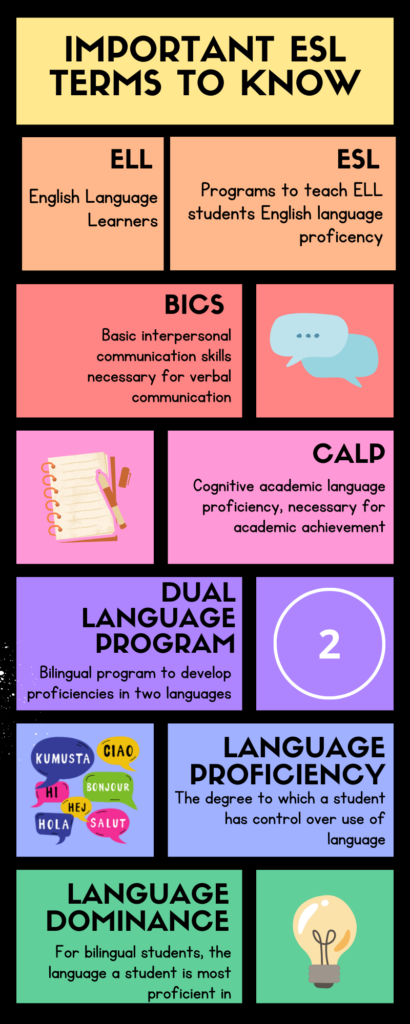
ESL instruction is almost always done in English and not in any other language. This is different from EFL, which stands for English as a foreign language. ESL takes place in English-speaking countries, whereas EFL instruction is used in countries where the predominant language isn’t English. ESL programs are also federally funded and typically involve pulling students out of the classroom. Teachers who work with these students are typically required to hold a special certificate. This is called TESOL, or “teaching English to speakers of other languages.”
There are two main elements of ESL instruction: BICS and CALP. BICS stands for basic interpersonal communication skills. This refers to the language ability required for verbal face-to-face communication. CALP is short for cognitive academic language proficiency, which is what is required for academic achievement. ESL programs use both components as part of the curriculum. They also focus on grammar, vocabulary, and pronunciation to enhance English language skills. BICS are easier to learn and often develop first, while CALP takes much longer to learn.
Is the term ESL outdated?
Here’s a caveat to our definition of ESL. While we use “ESL” because it’s still a commonly used acronym, we are also aware of its limitations as an inclusive term. Since ESL refers to learning English as a second language, it doesn’t encompass all English learners and doesn’t accurately reflect their linguistically diverse backgrounds. ESL implies a linear progression of language learning, and some ELL students are multilingual. Often, students may be learning English as a third or even fourth language. ELA, or English language acquisition, is another term we can use to more appropriately describe the process of learning English.
We can also use the acronym ESOL, English for speakers of other languages, to identify all students learning English. When possible, we also refer to ESL instruction as ELL programming, because it’s a more accurate and inclusive definition. It also emphasizes growth rather than focusing on deficiencies. We believe that understanding these distinctions is so important and that we have a responsibility to try to represent the experience of all learners.
To stay up-to-date on these definitions and learn more about students’ rights, check out these helpful ELL 101 tips.
Who qualifies for ESL/ELL instruction?
There is no such thing as a typical English language learner. Students may be immigrants or they may have been born in the United States. In fact, according to a survey from 2016, 72% of school-age students who qualified as English language learners were born in the United States . They might be multilingual and also come from various cultural backgrounds and socioeconomic statuses.
While ELL students are all unique, there are specific ways we can support them. Learning as much as we can about our students helps facilitate connection and can increase student buy-in as a result. Understanding a student’s family and background is vital too. Just like all students, ELL students want to belong and have fun in school, but they might need some extra support to do so . And rather than think of them as starting from a deficit, it can be helpful to reframe our perspective and focus on the gifts they can bring to our classroom. This video from Colorín Colorado reminds us of just how much ELL students can offer.
Ways To Support ELL Students
Let’s face it, learning a foreign language is hard. But we can all find ways to help support ELA for our students. The more we can understand the ins and outs of teaching English to non-native speakers, the more we can increase their chances of academic and social success, from our youngest ELL learners to those pursuing higher education. Here are our top suggestions for how to support ELLs in any setting.
Build relationships and celebrate diversity
For students to grow both socially and academically, they must feel comfortable and secure in the classroom. One way to support ELLs in this way is to recognize and honor cultural identities. Creating an environment for all students to feel appreciated for who they are helps establish a strong classroom community and fosters connection and engagement.
One great way to establish these types of successful relationships is to offer home visits. Seeing students in their home environments can be so helpful for establishing connections and honoring students’ unique backgrounds. The more we can get to know and understand our students’ identities, the more they will invest in the classroom community and be motivated to learn.
The video below from Colorín Colorado offers a helpful reminder of why it’s so important to build strong relationships with ELLs.
Offer plenty of time and practice
Developing language skills takes time, and we can’t rush it . Students may take years to reach the level of English proficiency they need to be successful in school. Nevertheless, we can offer a variety of opportunities for our students to support their emerging skills. The more peer interactions we can provide, the better. Partner or small-group work is great for facilitating oral language skills and gives us a better sense of how ELLs are progressing in their language development.
Continue to emphasize native language
With more than 1 billion English speakers in the world, learning English is a priority for students. But our overarching goal for ELLs is that they become bilingual or multilingual. So we have to encourage ELLs to continue to speak in and use their native languages. One way to do this is to encourage students to use their native language as part of the learning process. Larry Ferlazzo, an ELL educator and popular blogger, suggests using an instructional strategy called “preview, view, review.” The idea is to introduce new topics to students in their home languages by using different online resources. Then, teach the lesson in English, and finally, summarize the content again in their dominant language.
Offer extra wait time
When we pose a question to the class, we know it’s good practice to give sufficient wait time before calling on someone to answer. This is harder than you might think! It turns out we tend to overestimate how long we’re actually waiting. Studies show that we typically wait just one or two seconds before calling on students. For ELLs, this wait time is even more critical. When we offer extra time, we give students more space to process and translate their thoughts into English. Considering all the steps required in this process, we have to be extra mindful of how we are encouraging them to participate.
Engage families
Every parent is eager to hear positive feedback about their child and learn about what’s happening in the classroom. The more communication you can have with families, the more likely they are to get engaged in their child’s learning. When you reach out and make them feel comfortable, parents will be more willing to ask questions and bring up concerns on their end.
The video below suggests that families may have varying availability and accessibility, so we might have to get creative with how we communicate with them.
Differentiate and extend learning
Finding differentiated and unique ways to teach the same concept is an instructional practice that benefits all learners. For ELL students, it gives them multiple opportunities to learn a topic through different modalities. A student may be stronger in one area than another, and using different tools can also help reinforce learning through repetition. Incorporating a variety of activities like listening, writing, and speaking on the same topic can be tremendously helpful for ELLs.
Try one thing at a time
So much is new for ELLs. The following video is a helpful reminder to take things slow and focus on one new concept at a time.
Books and Resources
Colorín colorado.
This website is a fantastic resource for everything you need to know about how to teach English language learners. Learn more: Colorín Colorado
Literacy Foundations for English Learners
Author Elsa Cárdenas-Hagan is a wealth of knowledge on the topic of ELLs and using research-based practices to support their learning. She has many resources available online as well. Check out this podcast featuring tips specific to literacy and the science of reading for ELL students .
Buy it: Literacy Foundations for English Learners at Amazon
Activities To Boost Language Skills
Readers theater.
Using readers theater in the classroom is a great way to support ELL students’ literacy and language skills. Rereading a text many times, especially aloud, increases understanding, vocabulary development, and fluency. It can help students visualize what’s happening in a story as they act it out. It’s easy to differentiate by giving bigger or smaller parts to students based on their language skills. As students increase their skills and can showcase them, it can be a great confidence booster! For more tips and suggestions, check out these helpful steps for creating scripts and how to use them for younger students .
Quick Write
Writing can be overwhelming for ELL students. An activity like a quick write , where students try to write as much as they can for five minutes, might help alleviate some of the anxiety. The goal is to write on a specific topic for five minutes, not worrying about spelling or if they run out of things to say. At the end, have students jot down how many words they wrote and keep track of their progress over time. Check out this post for more ideas on how to improve writing skills for ELL students, which will in turn improve their oral language skills.
Circle Chat
Check out this fun, interactive activity where students take turns talking with partners . It’s a great way to boost communication skills and get everyone engaged.

Graphic Organizers
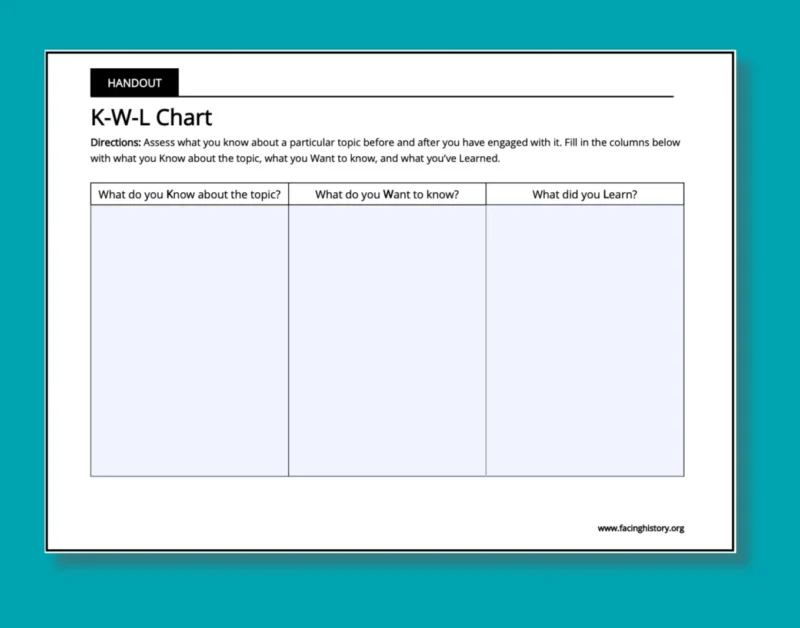
Graphic organizers can be great tools for visualizing concepts and making topics more concrete for ELL students. They can also help support vocabulary development. We like this K-W-L chart from Facing History & Ourselves , but there are so many options for all types of graphic organizers out there.
Do you work with ELL students? Come share your experience in the We Are Teachers HELPLINE group on Facebook.
Plus, check out ways to build ell vocabulary skills ..
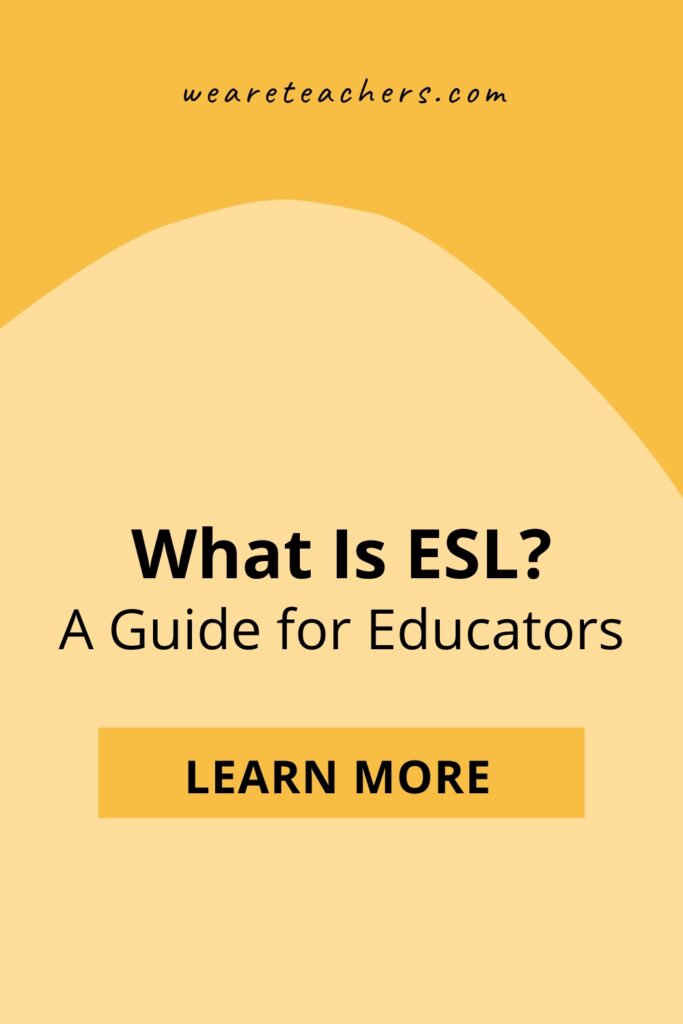
You Might Also Like
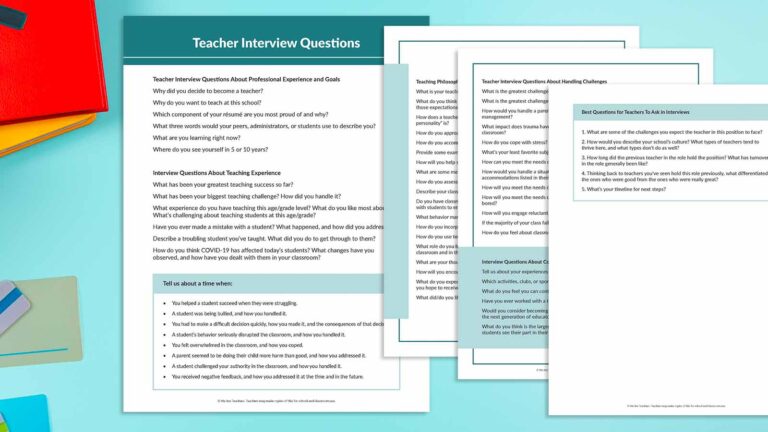
ESL Worksheets for Teachers
Check out our selection of worksheets filed under topic: education, teaching, and learning. use the search filters on the left to refine your search..
FILTER LESSONS
Customised lessons
Worksheet type
Elementary (A1-A2)
This lesson focuses on the spelling and pronunciation of common words with silent letters. Students start by reviewing the alphabet before listening to a short speech from a tour guide and completing related activities. They list and categorise words with silent letters and then practise the target language in speaking and writing. There is a short optional extension activity in which students describe a day out in London, using words from A to Z.
by Stephanie Hirschman
Pre-intermediate (A2-B1)
This lesson is based on the story of a woman in India who learnt to read and write at the age of 104. Vocabulary related to the subject of ambition and success is studied and practised. Students read a short text and listen to the same text, testing their reading and listening comprehension. The grammar point is specific and general ability in the past simple tense.
by Gillian Smylie
Upper-intermediate (B2-C1)
Students work with the theme of trends in an IELTS Writing Task 1. They discuss different types of music formats and examine a task with a line graph and a model answer before preparing to write a response to a similar question. Exam tips and marking frameworks are provided. There is also an optional extension task which provides practice in answering some discussion questions for part 3 of the speaking exam related to the topic of media formats and access. This lesson is part of one unit in the IELTS preparation course plan which provides practice in listening/speaking, reading and writing for the IELTS exam. The full lesson plan takes a minimum of 60 minutes.
Intermediate (B1-B2)
The topic of this lesson is changes students can make in their own schools and communities. Students read an article about how a 14-year-old brought together his whole school community to create positive change for all his classmates. Students learn level-appropriate vocabulary and move on to discuss changes they would like to make in their own schools and how they could do this. They will end this unit by taking part in an election for a school council. They will debate issues they feel passionate about and vote for a student president. At the end of the lesson, you will find a vocabulary revision game that covers the words and phrases used in this unit.
by Richard Moon
This lesson does double duty as IELTS reading exam practice and learner training and gives some context to the overall structure of this IELTS course, which centres around academic vocabulary, in this unit related to the theme of description. Students examine a sample dictionary entry to introduce them to the topic of wordlists for vocabulary study and then define vocabulary related to the reading. They respond to true/false/not given and matching features questions, before examining more useful words and phrases from the text. Exam tips are provided. There is also an activity which supports students to record and study academic vocabulary effectively.
This lesson is part of one unit in the IELTS preparation course plan which provide practice in listening/speaking, reading and writing for the IELTS exam. The full lesson plan takes a minimum of 60 minutes.
by Stephanie Hirschman.
*Note: this is a pilot lesson from our new course English for Teenagers.
The topic of this lesson is YouTubers. Students will watch a video about the most famous children and teenagers on YouTube to introduce the topic and then talk about how they have become famous. Throughout the lesson, they will learn vocabulary connected to technology and skills and qualities needed for careers in this field. They will read and discuss a magazine article about jobs in technology as well as advice from a famous YouTuber. Students will invent their own YouTube channel, write about it and imagine their life as a famous YouTuber.
by Richard Moon
A breaking news lesson about time capsules with a news report about a recent discovery and an article offering a brief history of time capsules. Students will learn related vocabulary, practise reading and listening skills and reinforce their new vocabulary with conversation practice.
by David J. Marriott
This lesson is based on information from New Zealand’s official website. Students will learn about New Zealand landmarks, geography and history and get some ideas of what to see and do if they visit New Zealand. Listening and reading skills will also be tested, and students will have the opportunity to prepare a presentation.
This lesson is based around a news report about a missing teenager being found in the United States and an article about how to tell if a relationship is abusive. Exercises look at connected vocabulary, reading skills and grammar work on Real Conditionals. Students will also have an opportunity to discuss situations related to the topic.
Note: While this is an educational worksheet, it does deal with the topic of domestic violence and mentions the abuse of young children in a non-graphic way. It will not be suitable for all classes and caution is advised.
by Joe Wilson
Students work with the theme of change in an IELTS Writing Task 2. They brainstorm the advantages and disadvantages of working from home before comparing their ideas with a model essay and identifying the exam task that the writer was responding to. They define some useful vocabulary and phrases from the essay and prepare to answer a similar exam question. Exam tips and marking frameworks are provided. There is also an optional task to support mastery of some useful verbs from the model essay.
by Stephanie Hirschman
This lesson is based around a video which looks at how we choose where we get our news from and how we can make good choices in doing so. Exercises look at related vocabulary and comprehension and ask students to discuss topics related to the subject.
* This lesson can last 60-90mins.
Linguahouse.com is in no way affiliated with, authorized, maintained, sponsored or endorsed by TED Conferences LLC.
Advanced (C1-C2)
The worksheet is based on a video looking at Margaret Atwood’s novel, The Handmaid’s Tale. Exercises look at vocabulary essential for both the video and the book, comprehension exercises and discussion centred around the topics of the book. This lesson would serve as an ideal primer for any teacher considering reading the book in class or introducing students to the literary themes it covers.
Note: Due to the nature of the book, this lesson deals with themes that some people will find upsetting, including rape and political and religious themes. Caution is advised as it will not be suitable for all groups of students.
In this audio-aided lesson, students learn vocabulary related to learning languages. The target language includes words and expressions for describing language learning and language ability as well as some useful questions for asking about words.
This short worksheet presents a list of discussion questions designed to encourage students to talk at length about their education and future plans.
This worksheet focuses on a video called ‘Why you should read Crime and Punishment' – a novel by Russian author Fyodor Dostoyevsky. Exercises focus on vocabulary from the video, rebuilding a text, collocations, use of adjectives and comprehension. Students will have the opportunity to discuss the themes mentioned in the video.
Note: Students and teachers do not need to have read the book or be familiar with the novelist in order to participate in the lesson. *This lesson can take 60-90mins.
by Joe Wilson
Would you like to help?

250+ Fun conversation topics
Conversation topics.
If you are looking for something to talk about or a specific discussion subject, then you are in the right place! Here are hundreds of conversation topics with thousands of questions on all manner of things. You are pretty much guaranteed to find a theme of discourse that you like.
Originally these conversation topics and their questions were designed for English learning activities but they have since evolved to become a comprehensive list that can be used by all English speakers. They can be used amongst friends, family, work colleagues, dating partners, and anybody who just wants something to chinwag about.
By clicking on one of the desired topics below you will be brought to a related page that has questions on the subject. Each page also has a free printable PDF of conversation questions along with some ideas to supplement the discussion with things like idioms.
This list and its contents have taken several years to assemble and is ever expanding. It is hoped that you will find the themed questions both useful and engaging in your quest for meaningful communication!
The discussion topics have been arranged in alphabetical order to make it easy and straightforward to find what you are looking for. The list of topics has also been broken down into 3 separate sections to make it even easier to navigate.
Conversation Topics A - E
Advertising
Artificial Intelligence
Body language
Books and reading
Bucket list
Communication
Comparatives
Construction and building
Consumerism
Daily Routines
Decisions and choices
Desert Island
Electricity
Entertainment
Environment
Extreme sports
Conversation Topics F - N
Fall and Autumn
Global warming
Health and sickness
Healthy living
Honesty and lies
How much how many
Natural disasters
Natural wonders
Nuclear energy
Conversation Topics O - Z
Past continuous
Past simple
Personality
Photography
Phrasal verbs
Predictions
Present perfect
Restaurants
Social Media
South America
Superlatives
Superstition
Thanksgiving
Unemployment
Video games
Water Sports
Would you rather
Zero conditional

Notes on using the conversation topics
The sheer volume of discussion topics and related questions here means that you can find something that the person or people that you are talking to feel interested in and passionate about. This in itself gives you a head start in having a rich and enjoyable conversation.
Try to approach your chosen subject with some freedom. Not all the questions provided need to be asked, or debated. You should also try to add some more questions of your own and even put a twist on those provided to make them more appropriate for your audience.
The questions are not intended to be met with Yes/No responses or short simple answers. Try to ask follow-up questions and inquire more about the replies you are given to stimulate more discourse. The more language you exchange while you are speaking, the more successful and beneficial your conversation will be.
You might also like these

40 funny alternate animal names game

Free onomatopoeia game (44 cards)
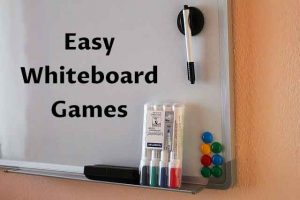
16 easy whiteboard games
Free ESL and English teaching resources, no sign up required. Just find what you like, download it and head to class!
Privacy Policy
Share ESL Vault with your friends!
- Writing Worksheets
- Vocabulary Worksheets
- Pronunciation
- Kids worksheets
- Idioms and Expressions
- ESL Puzzles
- ESL Pair Work Activities
- ESL Conversation Questions
- Coloring Pages
- Articles, Lists and Ideas
- Art and Craft Activities
ESL Discussions
14,180 english conversation questions.
* 709 discussions. * Ready-to-print handouts. * Everyday & controversial topics.
Help My Site
Copyright © 2008-2023 by Sean Banville | Links | Privacy Policy

Ace your next job interview
Dive into the realm of job interviews with this lesson. Students practise job interview vocabulary, watch a video for tips, talk about what can make an interview successful and learn about the STAR approach for responding to interview questions.
Teach English using thought-provoking, engaging and topical lesson plans based on authentic materials . Provide high-quality ESL classes for adults , both online and offline.
Become a member to get more content
Subscribe to get access to professional, ready-to-use lesson plans in both digital and printable formats . Discover a variety of lesson types: Standard Lessons, Speaking Classes, Critical Reading Club worksheets and Flipped Classroom lesson plans.
Our latest lesson plans

It’s your special day!
With this fun lesson, students talk about celebrations and their personal experiences. They watch and discuss a video about celebrating someone’s birthday on a budget and discuss birthday celebration ideas. Students also practise phrases related to birthdays.
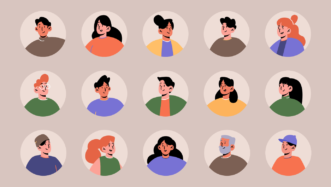
Lone wolf or social butterfly? Understanding personalities
With this lesson, students talk about personality types, revise adjectives to describe themselves and watch a video about how birth order affects a person. They also brainstorm why people change their personalities and discuss whether they agree with different opinions.

The things we want and the things we need (stative verbs)
In this lesson, students dive into the world of self-expression, watch an ad for a trading website and practise stative and active verbs. They also talk about their preferences and use the target vocabulary to describe people’s personalities.

Financial crimes
In this lesson, students practise vocabulary related to financial crimes and watch a video about money laundering. They also discuss real cases of financial fraud, read a film synopsis and talk about their personal opinions.

Music festivals and other outdoor events
With this speaking lesson, students talk about festivals and other outdoor events. They read short texts, discuss music festival tips and watch a video about it. Students also talk about the use of technology and brainstorm useful gadgets for such events.

Spring is in the air
This fun lesson contains various standalone activities that allow students to explore vocabulary to talk about spring, do a crossword puzzle and practise collocations with ‘green’. They can also discuss reasons for enjoying or disliking spring and practise phrasal verbs.

Company roles
Dive into the world of different job roles with this lesson! Students practise phrases related to the topic, discuss their personal experiences, watch a promo video for a company and imagine starting a business.

Shopping experience
In this speaking lesson, students talk about their shopping preferences and experiences. They also practise vocabulary related to the topic, assess situations related to shopping and watch a video about a second-hand department store.

Brave new influencers
With this Flipped lesson, advanced students get a great chance to revise and practise grammatical aspects, learn collocations connected to social media activity and have engaging conversations about AI influencers.

From a pushover to your own boss
With this lesson, students talk about personal boundaries, watch a video with tips and practise vocabulary related to the topic. They also reflect upon responses to challenging situations and discuss different points of view.

Coffee time!
Discuss weirdly interesting cafés around the world with this lesson! After reading an article, students practise vocabulary related to coffee and cafés, talk about their personal experiences and preferences, and analyse the establishments from the piece they read.
Browse lesson plans by topic
Collocations, internet vocabulary, house and home, tv & cinema, environment, subscribe to get premium content.
Username or Email Address
Remember Me
- Our Mission
Adapting Math Word Problems for ELLs
To make word problems less confusing, especially for English language learners, change the language, not the math. Here are some ideas.

All students have a right to rigorous and challenging math classes, and word problems are a ubiquitous part of elementary and middle school math. Complex language structures or overly challenging vocabulary, however, can sometimes create barriers for students that impede access to a rigorous and challenging math curriculum. This is particularly true for English language learners (ELLs).
As teachers, we strive to cultivate mathematical reasoning and help students apply math to real-world contexts. When designing instruction for our English language learners, we have to ensure that they are afforded access to rich math tasks but also attend to the unique challenges of students working to acquire an understanding of the language. Fortunately, by attending to our vocabulary choices and sentence structure, we can adapt word problems and ensure that all students have access to rich mathematical content.
Certain linguistic features commonly found in middle school math classes are especially problematic. Passive voice, complex sentences, and long noun phrases or clauses can be very difficult for all learners, but especially multilingual students developing English proficiency. Unfamiliar vocabulary, novel context, and poorly worded or vague questions can also create barriers to understanding. Small changes that simplify language, however, can significantly improve accessibility and ensure that more students can tackle rich math tasks.
Adapting the Math Language
Use the active voice: The passive voice can obscure what is actually happening in a word problem. Use the active voice to show people engaging with the world. For instance, rather than “The ball was thrown by the girl,” revise the sentence structure to “The girl threw the ball.”
Separate complex sentences: Break up long, convoluted, and meandering sentences to express key ideas. Consider the difference between “A hot dog costs $3.75 and a side salad costs $1.65. If a group of 5 students ordered 6 hot dogs and 4 side salads, and they left an 18% tip, how much did they pay in total, including the tip?” and the revised problem, “A group of friends ordered 6 cheeseburgers at $6.50 each and 4 side salads at $1.65 each. They left an 18% tip on the total bill. How much did they pay in total, including the tip?”
Both versions require the same mathematical understanding, but the language of the second is clearer and more accessible.
Simplify verb tense: Lean toward simple present tense. “The maintenance crew repairs the AC unit” rather than “has been repairing.”
Center people in the problem: Humanize problems with people rather than impersonal subjects. “85% of parents supported the schedule,” not “85% of the votes supported....”
Use familiar vocabulary: Swap challenging terminology for more recognizable vocabulary. “The school is hosting a fundraiser by selling concessions during the basketball tournament. If they sold 322 hamburgers at $3 each and 211 hot dogs at $2 each, what was the total revenue from the concession stand sales?”
Here’s a suggested alternative: “The school wants to raise money by selling food at a basketball game. They sold 322 hamburgers for $3 each and 211 hot dogs for $2 each. How much did the school make from selling the food?” Of course, some students will require additional supports, such as pictures and labels for key vocabulary found in word problems.
Shorten clauses: Trim unnecessary clauses. Instead of “The math tutor, who has taught for 10 years, helps students,” use “The math tutor helps students. She taught for 10 years.”
Replace obscure questions: Be sure to look for vague questions that distract from the math and substitute clear, direct questions. Change “What was the resulting amount after the chef used 16½ cups of milk?” to “The chef used 16½ cups of milk to make ice cream. Calculate how much ice cream the chef made yesterday.” Is something missing here?
Consider the big idea: Notice that in the previous example, students do not have enough information to solve the problem. When adapting math word problems for English language learners, revise the construction of your questions to clarify the task at hand, but also be mindful to simultaneously help students to think like mathematicians. To paraphrase what math education innovator Dan Meyer notes in his TED Talk on math instruction , real-world problems do not contain a simple list of all the required information.
As you adapt math instruction for English language learners, be sure to design rich experiences and help them to develop a mathematical mindset. What additional information do I need to solve this problem? What can I do to find the missing information? English language learners need accessible English, but they also need experiences that help them develop habits of inquiry, problem-solving, and self-efficacy.
The key is to adapt language without watering down rich mathematical thinking and problem-solving. Be sure to maintain high expectations while providing appropriate linguistic support. With slight modifications to ensure comprehensible and accessible language, your English language learners can tackle the same meaningful math as their peers.
Equity in math education means meeting each student where they are and helping them reach meaningful goals. Adjusting language is one path toward creating a math community that works for everyone.
Remember, context matters: Real-world contexts allow students to see math as a meaningful tool, rather than an abstract set of rules. However, take care not to introduce obscure, unfamiliar contexts that overwhelm ELLs with new vocabulary. Similarly, jumping between many different contexts in short succession can impede understanding.
When selecting contexts for word problems and examples, opt for familiar situations from students’ everyday lives that clearly illuminate the mathematical concepts. Additionally, aim to consistently revisit and reinforce the same contexts when teaching specific concepts, math models, or problem types. Repeated exposure across similar situations allows ELLs to digest both the linguistic and mathematical nuances. As comfort builds, you can broaden into new contexts, always taking care to explain unfamiliar vocabulary or scenarios that are essential to the problem.
The goal is to have students see math as meaningful while preventing contexts from distracting from the essential mathematical reasoning. Familiar, consistent contextualization keeps the focus on math concepts and problem-solving strategies.
The Power of Mathematical Models and Manipulatives
In addition to thoughtful verbal and written language adaptations, mathematical models and manipulatives provide critical visual and tactile scaffolds that support deeper understanding and reasoning for English language learners. Charts, ratio tables, coordinate planes, fraction models, graphs, algebra tiles , base-ten blocks, and more make concepts concrete while mitigating vocabulary barriers.
Leveraging models and manipulatives moves learning toward mathematical action. Students demonstrate conceptual connections nonverbally, allowing alternative pathways to develop understandings. All students access deeper thinking as teachers elevate mathematical visualization alongside precision in academic language.
When planning for math instruction and adapting for our multilingual learners, I’ve found these resources to be particularly helpful:
- Teaching Math to Multilingual Students, Grades K–8: Positioning English Learners for Success ,
- “ Mathematical mindsets: Unleashing students’ potential through creative math, inspiring messages and innovative teaching ,” and
- Math Workshop: Five Steps to Implementing Guided Math, Learning Stations, Reflection, and More .
Ultimately, we want students to develop a deep conceptual understanding of mathematics and to grow their English language proficiency. Slight adaptations to language, the use of familiar real-world contexts, and deliberately incorporating mathematical models and manipulatives can help students to access the math curriculum and to acquire English.
We’d like to know—what strategies have you successfully used to help improve math accessibility for ELL students? Please comment and share.

The English School of Science and Information Technologies

- Admission Procedure
- Enquire Now

This year, the Moscow winter turned out to be unusually snowy and cold. However, as the saying goes, there is no bad weather, there are bad clothes. With the health of our students in mind, we took th...
September News from Nursery and Reception
Hello, hello, hello! Welcome back to everyone returning and a big warm welcome to all our new students! September for the Nursery is a time of getting to know each other and getting used to the school...
Windows 11, version 23H2
April 9, 2024—kb5036893 (os builds 22621.3447 and 22631.3447).
- March 26, 2024—KB5035942 (OS Builds 22621.3374 and 22631.3374) Preview
- March 12, 2024—KB5035853 (OS Builds 22621.3296 and 22631.3296)
- February 29, 2024—KB5034848 (OS Builds 22621.3235 and 22631.3235) Preview
- February 13, 2024—KB5034765 (OS Builds 22621.3155 and 22631.3155)
- January 23, 2024—KB5034204 (OS Builds 22621.3085 and 22631.3085) Preview
- January 9, 2024—KB5034123 (OS Builds 22621.3007 and 22631.3007)
- December 12, 2023—KB5033375 (OS Builds 22621.2861 and 22631.2861)
- December 4, 2023—KB5032288 (OS Builds 22621.2792 and 22631.2792) Preview
- November 14, 2023—KB5032190 (OS Builds 22621.2715 and 22631.2715)
- October 31, 2023—KB5031455 (OS Builds 22621.2506 and 22631.2506) Preview
Windows 11, version 22H2
- October 10, 2023—KB5031354 (OS Build 22621.2428)
- September 26, 2023—KB5030310 (OS Build 22621.2361) Preview
- September 12, 2023—KB5030219 (OS Build 22621.2283)
- August 22, 2023—KB5029351 (OS Build 22621.2215) Preview
- August 8, 2023—KB5029263 (OS Build 22621.2134)
- July 26, 2023—KB5028254 (OS Build 22621.2070) Preview
- July 11, 2023—KB5028185 (OS Build 22621.1992)
- June 27, 2023—KB5027303 (OS Build 22621.1928) Preview
- June 13, 2023—KB5027231 (OS Build 22621.1848)
- May 24, 2023—KB5026446 (OS Build 22621.1778) Preview
- May 9, 2023—KB5026372 (OS Build 22621.1702)
- April 25, 2023—KB5025305 (OS Build 22621.1635) Preview
- April 11, 2023—KB5025239 (OS Build 22621.1555)
- March 28, 2023—KB5023778 (OS Build 22621.1485) Preview
- March 14, 2023—KB5023706 (OS Build 22621.1413)
- February 28, 2023—KB5022913 (OS Build 22621.1344) Preview
- February 14, 2023—KB5022845 (OS Build 22621.1265)
- January 26, 2023—KB5022360 (OS Build 22621.1194) Preview
- January 10, 2023—KB5022303 (OS Build 22621.1105)
- December 13, 2022—KB5021255 (OS Build 22621.963)
- November 29, 2022—KB5020044 (OS Build 22621.900) Preview
- November 8, 2022—KB5019980 (OS Build 22621.819)
- October 25, 2022—KB5018496 (OS Build 22621.755) Preview
- October 18, 2022—KB5019509 (OS Build 22621.675) Out-of-band
- October 11, 2022—KB5018427 (OS Build 22621.674)
- September 30, 2022—KB5017389 (OS Build 22621.608) Preview
- Windows 11, version 21H2
- April 9, 2024—KB5036894 (OS Build 22000.2899)
- March 12, 2024—KB5035854 (OS Build 22000.2836)
- February 13, 2024—KB5034766 (OS Build 22000.2777)
- January 9, 2024—KB5034121 (OS Build 22000.2713)
- December 12, 2023—KB5033369 (OS Build 22000.2652)
- November 14, 2023—KB5032192 (OS Build 22000.2600)
- October 10, 2023—KB5031358 (OS Build 22000.2538)
- September 26, 2023—KB5030301 (OS Build 22000.2482) Preview
- September 12, 2023—KB5030217 (OS Build 22000.2416)
- August 22, 2023—KB5029332 (OS Build 22000.2360) Preview
- August 8, 2023—KB5029253 (OS Build 22000.2295)
- July 25, 2023—KB5028245 (OS Build 22000.2245) Preview
- July 11, 2023—KB5028182 (OS Build 22000.2176)
- June 28, 2023—KB5027292 (OS Build 22000.2124) Preview
- June 13, 2023—KB5027223 (OS Build 22000.2057)
- May 23, 2023—KB5026436 (OS Build 22000.2003) Preview
- May 9, 2023—KB5026368 (OS Build 22000.1936)
- April 25, 2023—KB5025298 (OS Build 22000.1880) Preview
- April 11, 2023—KB5025224 (OS Build 22000.1817)
- March 28, 2023—KB5023774 (OS Build 22000.1761) Preview
- March 14, 2023—KB5023698 (OS Build 22000.1696)
- February 21, 2023—KB5022905 (OS Build 22000.1641) Preview
- February 14, 2023—KB5022836 (OS Build 22000.1574)
- January 19, 2023—KB5019274 (OS Build 22000.1516) Preview
- January 10, 2023—KB5022287 (OS Build 22000.1455)
- December 13, 2022—KB5021234 (OS Build 22000.1335)
- November 15, 2022—KB5019157 (OS Build 22000.1281) Preview
- November 8, 2022—KB5019961 (OS Build 22000.1219)
- October 25, 2022—KB5018483 (OS Build 22000.1165) Preview
- October 17, 2022—KB5020387 (OS Build 22000.1100) Out-of-band
- October 11, 2022—KB5018418 (OS Build 22000.1098)
- September 20, 2022—KB5017383 (OS Build 22000.1042) Preview
- September 13, 2022—KB5017328 (OS Build 22000.978)
- August 25, 2022—KB5016691 (OS Build 22000.918) Preview
- August 9, 2022—KB5016629 (OS Build 22000.856)
- July 21, 2022—KB5015882 (OS Build 22000.832) Preview
- July 12, 2022—KB5015814 (OS Build 22000.795)
- June 23, 2022—KB5014668 (OS Build 22000.778) Preview
- June 20, 2022—KB5016138 (OS Build 22000.740) Out-of-band
- June 14, 2022—KB5014697 (OS Build 22000.739)
- May 24, 2022—KB5014019 (OS Build 22000.708) Preview
- May 10, 2022—KB5013943 (OS Build 22000.675)
- April 25, 2022—KB5012643 (OS Build 22000.652) Preview
- April 12, 2022—KB5012592 (OS Build 22000.613)
- March 28, 2022—KB5011563 (OS Build 22000.593) Preview
- March 8, 2022—KB5011493 (OS Build 22000.556)
- February 15, 2022—KB5010414 (OS Build 22000.527) Preview
- February 8, 2022—KB5010386 (OS Build 22000.493)
- January 25, 2022—KB5008353 (OS Build 22000.469) Preview
- January 17, 2022—KB5010795 (OS Build 22000.438) Out-of-band
- January 11, 2022—KB5009566 (OS Build 22000.434)
- December 14, 2021—KB5008215 (OS Build 22000.376)
- November 22, 2021—KB5007262 (OS Build 22000.348) Preview
- November 9, 2021—KB5007215 (OS Build 22000.318)
- October 21, 2021—KB5006746 (OS Build 22000.282) Preview
- October 12, 2021—KB5006674 (OS Build 22000.258)

Release Date:
OS Builds 22621.3447 and 22631.3447
2/27/24 IMPORTANT: New dates for the end of non-security updates for Windows 11, version 22H2
The new end date is June 24, 2025 for Windows 11, version 22H2 Enterprise and Education editions. Home and Pro editions of version 22H2 will receive non-security preview updates until June, 26, 2024.
After these dates, only cumulative monthly security updates will continue for the supported editions of Windows 11, version 22H2. The initial date communicated for this change was February 27, 2024. Based on user feedback, this date has been changed so more customers can take advantage of our continuous innovations .
For information about Windows update terminology, see the article about the types of Windows updates and the monthly quality update types . For an overview of Windows 11, version 23H2, see its update history page .
Note Follow @WindowsUpdate to find out when new content is published to the Windows release health dashboard.

Tip: The content is within collapsible sections. Click or tap the category name to expand the section.
Voice access
New! You can now use voice access with the following languages:
French (France, Canada)
Spanish (Spain, Mexico)
When you turn on voice access for the first time, Windows will ask you to download a speech model. You might not find a speech model that matches your display language. You can still use voice access in English (US). You can always choose a different language from Settings > Language on the voice access bar.
New! You can now use all voice access features on multiple displays. These include number and grid overlays that, in the past, you could only use on the primary display. While you are using the grid overlay on a screen, you can quickly switch to another display. To do that, use the alphabet or NATO phonetic in your command. For example, “B” or “Bravo” are both valid for the display that is assigned that letter.
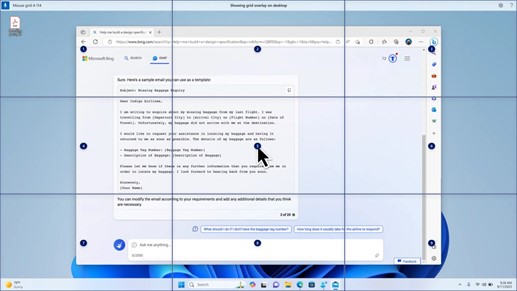
New! This update introducesvoice shortcuts or custom commands. You can use them to create your own commands in the supported English dialects. To start, say “what can I say” and click the “Voice shortcuts” tab on the left panel. You can also use the command “show voice shortcuts” to open the Voice shortcuts page. Click Create new shortcut . Use your voice or other input to create a command. Give it a name and select one or more actions. After you fill in the necessary information, click Create . Your command is now ready to use. To view all the voice shortcuts you have created, go to the command help page or use the voice command, “show voice shortcuts.”
New! You can now listen to a preview of the ten natural voices before you download them. See the Narrator section of the September 2023 update for the list. These voices use modern , on-device text-to-speech. Once you download them, they work without an internet connection. However, to listen to a preview, you need an internet connection. To add and use one of the natural voices, follow the steps below.
To open Narrator settings, press the WIN+CTRL+N hotkey.
Under Narrator’s voice, select Add , which is next to Add natural voices .
Select the voice you want to install. You can install all voices, but you must install them one at a time.
The preview will play automatically as you browse the list.
If you like the preview, click Download and Install . The new voice downloads and is ready for use in a few minutes, depending on your internet download speed.
In Narrator settings, select your preferred voice from the menu in Narrator’s voice > Choose a voice .
New! This update adds a new keyboard command to move between the images on a screen. Now, you can use the keys G or Shift+G to move forward or backward between images in Scan mode (Narrator key+space bar).
New! This update improves Narrator’s detection of text in images, which includes handwriting. It also improves the descriptions of images. To use this feature, you must have an active internet connection. You must also turn on the setting to get image descriptions in Narrator settings. To try this experience, select an image and press the Narrator key+CTRL+D.
New! In Microsoft Word, Narrator will announce the presence of bookmarks and draft or resolved comments. It also tells you if accessibility suggestions exist when it reads text in the file.
New! You can now use voice access to open applications, dictate text, and interact with elements on the screen. You can also use your voice to command Narrator. For example, you can tell it to, “speak faster,” “read next line,” and so on. To get started, search for “voice access” in Windows search and set it up.
Windows share
New! This update changes the apps that appear in the Windows share window. The account you use to sign in affects the apps that are in “Share using.” For example, if you use a Microsoft account (MSA) to sign in, you will see Microsoft Teams (free). When you use a Microsoft Entra ID account (formerly Azure Active Directory) to sign in, your Microsoft Teams (work or school) contacts show instead.
New! The Windows share window now supports sharing with WhatsApp in the “Share using” section. If you do not have WhatsApp installed, you can install it from the Windows share window.
Nearby Share
New! This update affects how Nearby Share turns on and off. You can use quick settings or the Settings app to turn on Nearby Share. If you do and Wi-Fi and Bluetooth are off, Wi-Fi and Bluetooth will turn on to make Nearby Share work as you expect. If you turn off Wi-Fi or Bluetooth, Nearby Share turns off as well.
New! This update improves Nearby Share transfer speed for users on the same network. Before, users had to be on the same private network. Now, users must be on the same public or private network. You can use quick settings to turn on Nearby Share. Right-click a local file in File Explorer and choose “Share.” Then choose to share to a device listed in Nearby Share in the Windows share window.
New! You can now give your device a more friendly name to identify it when sharing. Go to Settings > System > Nearby sharing . There, you can rename your device.
New! This update helps you to learn about the Cast feature and discover when it is available; see the examples in the list below. To cast means to send content that is on your device’s screen to a nearby PC, TV, or other external displays. This happens wirelessly.
You might often switch between windows to complete a task or use Snap Assist to organize your screen space. When you multitask like this, a notification will suggest that you use Cast.
The Cast flyout menu in quick settings gives you more help to find nearby displays, fix connections, and more.
Snap Layouts
New! This update adds suggestions to Snap Layouts . They help you to instantly snap multiple app windows together.
New! You can hover over the minimize or maximize button of an app (WIN+Z) to open the layout box. When you do, app icons will display various layout options. Use them to help you to choose the best layout option.
Windows 365 Boot
New! This update adds dedicated mode for Windows 365 Boot . When you sign in on your company-owned device, doing that also signs you in to your Windows 365 Cloud PC. This occurs using passwordless authentication, like Windows Hello for Business.
New! This new dedicated mode also provides the fast account switcher experience. With it, you can quickly switch profiles and sign in. You can also personalize the experience for your username and password. This includes choosing a custom display picture for the lock screen, storing your username, and more.
New! A company can customize what users see on the screen when they sign in to Windows 365 Boot. In shared mode, you can add company branding from Microsoft Intune.
New! This update adds a fail fast mechanism for Windows 365 Boot. It helps while you are signing in to your Cloud PC. Thesmart logic tells you to address network issues or complete app setup so that Windows 365 Boot does not fail.
New! You can now manage the settings of your physical (local) PC from your Cloud PC. Windows 365 Boot makes it easy to directly access and manage sound, display, and other device settings.
Windows 365 Switch
New! It is now easier for Windows 365 Switch to disconnect. You can use your local PC to disconnect from your Cloud PC. Go to Local PC > Task view . Right-click the Cloud PC button and select Disconnect . This update also adds tooltips to the Cloud PC Start menu. They appear on the options for disconnecting and signing out and help you to learn how each one works.
New! This update adds desktop indicators for Windows 365 Switch.You will see the term “Cloud PC” and “Local PC” on the desktop indicator when you switch between them.
New! The time to connect to Windows 365 Frontline Cloud PC from Windows 365 Switch might be long. While you wait, the screen will show you the connection status and the timeout indicator for the Cloud PC. If there is an error, use the new copy button on the error screen to copy the correlation ID. This helps to address the issue faster.
Improvements
Note: To view the list of addressed issues, click or tap the OS name to expand the collapsible section.
Important: Use EKB KB5027397 to update to Windows 11, version 23H2.
This security update includes quality improvements. Key changes include:
This build includes all the improvements in Windows 11, version 22H2.
No additional issues are documented for this release.
This security update includes improvements that were a part of update KB5035942 (released March 26, 2024). When you install this KB:
This update makes miscellaneous security improvements to internal OS functionality. No additional issues were documented for this release.
If you installed earlier updates, only the new updates contained in this package will be downloaded and installed on your device.
For more information about security vulnerabilities, please refer to the Security Update Guide website and the April 2024 Security Updates .
Windows 11 servicing stack update - 22621.3447 and 22631.3447
This update makes quality improvements to the servicing stack, which is the component that installs Windows updates. Servicing stack updates (SSU) ensure that you have a robust and reliable servicing stack so that your devices can receive and install Microsoft updates.
Known issues in this update
Microsoft is not currently aware of any issues with this update.
How to get this update
Before installing this update
Microsoft combines the latest servicing stack update (SSU) for your operating system with the latest cumulative update (LCU). For general information about SSUs, see Servicing stack updates and Servicing Stack Updates (SSU): Frequently Asked Questions .
Install this update
If you want to remove the LCU
To remove the LCU after installing the combined SSU and LCU package, use the DISM/Remove-Package command line option with the LCU package name as the argument. You can find the package name by using this command: DISM /online /get-packages .
Running Windows Update Standalone Installer ( wusa.exe ) with the /uninstall switch on the combined package will not work because the combined package contains the SSU. You cannot remove the SSU from the system after installation.
File information
For a list of the files that are provided in this update, download the file information for cumulative update 5036893 .
For a list of the files that are provided in the servicing stack update, download the file information for the SSU - versions 22621.3447 and 22631.3447 .

Need more help?
Want more options.
Explore subscription benefits, browse training courses, learn how to secure your device, and more.

Microsoft 365 subscription benefits

Microsoft 365 training

Microsoft security

Accessibility center
Communities help you ask and answer questions, give feedback, and hear from experts with rich knowledge.

Ask the Microsoft Community

Microsoft Tech Community

Windows Insiders
Microsoft 365 Insiders
Was this information helpful?
Thank you for your feedback.
- English English
- தமிழ் தமிழ்
- বাংলা বাংলা
- മലയാളം മലയാളം
- ગુજરાતી ગુજરાતી
- हिंदी हिंदी
- मराठी मराठी
- Business Business
- बिज़नेस बिज़नेस
- Insurance Insurance
The Financial Express
- Mutual Funds
- Stock Market Stats
- Gold Rate Today
- AP SSC 10th Result 2024 Live
- TSBSE Live Updates
- Top Indices Performance
- MP Board Result Live
- JEE Main Session 2 Live Updates
- Loksabha Election
- Budget 2024
- Stock Market Quotes
- Mutual Fund
- Stock Stats
- Top Gainers
- CaFE Invest
- Investing Abroad
- Gold Rate in India
- Silver Rate in India
- Petrol Rate in India
- Diesel Rate in India
- Express Mobility
- Banking & Finance
- Travel & Tourism
- Brand Wagon
- Entertainment
- Web Stories
- Auto Web Stories
- Infographics
- Today’s Paper
- International
- Edits & Columns
- Personal Finance Print
- PRIVACY POLICY
- TERMS AND CONDITIONS

JEE Mains 2024 Result: NTA expected to announce results soon! Know how to check your score
Jeemain.nta.ac.in jee mains 2024 tomorrow, april 23.

The National Testing Agency (NTA) is expected to release the results for the April session of JEE Main tomorrow, April 23. Candidates will be able to access the result on the official website – jeemain.nta.nic.in.
The NTA has already released the final answer key for the second session of the Joint Entrance Exam Main ( JEE Main ). The exam was conducted between April 4 and 12, and witnessed participation from more than 12.57 lakh candidates.

The results for JEE Main session 2 will be announced concurrently with the JEE Advanced cut-off, national rank holders, and state-wise toppers.

JEE Mains 2024 Result: How to check Candidates can follow the following steps to access their results.
Visit the official website of NTA JEE at jeemain.nta.ac.in
Click on the ‘JEE Mains Result 2024 for Session 2’ link available on the homepage
Enter your login details and click on submit
Your result will be displayed on the screen
Check your result and download the page
Keep a hard copy of the same for future use.
Get live Share Market updates, Stock Market Quotes , and the latest India News and business news on Financial Express. Download the Financial Express App for the latest finance news.
Related News
The NTA will release the JEE Main results for the April session tomorrow on the official website. The exam was conducted from April 4 to 12 with over 12.57 lakh candidates participating. The results will include the final answer key, JEE Advanced cut-off, national rank holders, and state-wise toppers. Candidates can check their results by following simple steps on the NTA JEE website.
Photo Gallery
5 UP Board Result 2017 class 10 topper: Tejaswi Devi tops with 95.83 pct; Yogi Adityanath to award Rs 10,000 to every girl who passed
6 UP Board Result 2017: Uttar Pradesh Class 10th and 12th results declared today at upresults.nic.in, upmsp.edu.in
5 UP Board Result 2017 class 12 topper Priyanshi Tiwari scores 96.20 pct; check upresults.nic.in, upmsp.edu.in for passing percentage and more
Latest News

Gaming the system! As offshore online gaming platforms continue to operate in India, home-grown firms take the beat Premium Story

Tsbie.cgg.gov.in TS Inter Result Manabadi 2024 Live Updates: Telangana TSBIE 1st, 2nd year scores on April 24

Breaking News LIVE: UK Parliament approves Rwanda deportation bill

Stock Market LIVE: GIFT Nifty indicates a positive start for domestic indices BSE Sensex and NSE Nifty 50

UK Immigrant? eVisas to replace biometric residency permits by 2025
Trending topics.
- IPO’s Open and Upcoming 1
- Stock Analysis
- Financial Literacy
- NSE Top Gainers 1862
- NSE Top Losers 711
- BSE Top Gainers 2764
- BSE Top Losers 1403
- NSE 52-Week High 0
- NSE 52-Week Low 0
- BSE 52-Week High 0
- BSE 52-Week Low 0
- NSE Price Shocker
- NSE Volume Shocker
- BSE Price Shocker
- BSE Volume Shocker
- NSE Sellers
- BSE Sellers
- Silver Rate Today
- Petrol Rate Today
- Diesel Rate Today


COMMENTS
Education, school, and university are great ESL discussion topics! Get everyone talking with these ESL conversation questions about education, school, and university. Almost everyone in the world has had direct experience with education in some way, shape, or form. So get your students talking and sharing their experiences on the education ...
Education. Showing results in all conversations for English learners of all levels based on the search term " Education ".
Listening to music with English lyrics can be fun and engaging activity that can also start conversations. Watching music videos with subtitles will help students remember the vocabulary they hear in a song. 8. Television. Television is one of those topics that everyone has an opinion about.
In this ESL lesson, students practise talking about technology. They also watch two videos about a robot companion for kids, learn vocabulary related to the topic, and write short comments about the video. Premium Plan Show. A2 / Pre‐Intermediate. Standard Lesson 60 min. Add to saved lessons.
Depending on the level, it may also be necessary to pre-teach any challenging vocabulary related to education contained in the discussion questions. For more ESL discussion questions, see this site's main page. There are discussion questions on a range of topics including general, grammar and business English topics.
What are the skills that separate good students from bad students? Were good grades important to you? Did teachers grade students fairly? Did you ever feel like you should have gotten a better grade then you did in a class? Did you procrastinate studying? Did you ever pull an all nighter?
This site contains more than a thousand ESL discussion questions on a range of topics including general, grammar and business English discussion topics. These discussion questions are suitable for teachers to use in the ESL classroom with students at intermediate level or above.
Guided discussions are a great way for ESL students to improve both language and critical thinking skills. This lesson provides a variety of education-related topics that ESL students may discuss ...
This free ESL lesson plan on education has been designed for adults and young adults at an intermediate (B1/B2) to advanced (C1/C2) level and should last around 45 to 60 minutes for one student. ... This is followed by an initial discussion on the topic including their experience at school, their favourite subjects and the best qualities in a ...
Discover a world of conversation possibilities with thousands of questions designed specifically for ESL teachers. With a wide range of topics, split into beginner, intermediate, and advanced levels, you're sure to find something that suits your needs. Explore different ways to encourage discussion with your students while improving their ...
Instead, say : "I'm a fourth year university student." Grades are used for elementary, middle and high school, not university. 4.) When you take a test, you get a "score". All your test results combined make your overall "grade". Therefore, "I didn't score well on my last exam but my overall grade is good."
The education system. Upper-intermediate (B2-C1) In this lesson, students learn how to describe the education system in the UK, USA and in their own countries. The worksheet includes an exercise on education-related idioms. You can also use it as an alternative to Ex5 of our video-aided worksheet English Mania. Business English.
ESL implies a linear progression of language learning, and some ELL students are multilingual. Often, students may be learning English as a third or even fourth language. ELA, or English language acquisition, is another term we can use to more appropriately describe the process of learning English. We can also use the acronym ESOL, English for ...
This lesson is part of one unit in the IELTS preparation course plan which provides practice in listening/speaking, reading and writing for the IELTS exam. The full lesson plan takes a minimum of 60 minutes. by Stephanie Hirschman. 60 min. School council.
Conversation Questions for the ESL/EFL ClassroomA Project of The Internet TESL Journal. Conversation Questions for the ESL/EFL Classroom. A Project of. The Internet TESL Journal. If this is your first time here, then read the Teacher's Guide to Using These Pages. If you can think of a good question for any list, please send it to us.
The discussion topics have been arranged in alphabetical order to make it easy and straightforward to find what you are looking for. The list of topics has also been broken down into 3 separate sections to make it even easier to navigate. Cities. Clothing. Coffee.
14,180 discussion and conversation questions for speaking practice. 709 FREE ESL lesson plans, handouts, worksheets and downloads. Controversial and mainstream topics.
In this post, I've curated 100 controversial ESL debates that are guaranteed to get your students going. How to use these ESL Debate topics. In order to get the best out of these topics, there are a few things you should consider before presenting them to your class. English level. If you think debating in your native language is tough, try ...
Discover a variety of lesson types: Standard Lessons, Speaking Classes, Critical Reading Club worksheets and Flipped Classroom lesson plans. See our ESL lesson plans and worksheets for teaching adults which touch contemporary topics. All materials are based on TED Talks or other video materials.
Separate complex sentences: Break up long, convoluted, and meandering sentences to express key ideas. Consider the difference between "A hot dog costs $3.75 and a side salad costs $1.65. If a group of 5 students ordered 6 hot dogs and 4 side salads, and they left an 18% tip, how much did they pay in total, including the tip?" and the revised problem, "A group of friends ordered 6 ...
ESF is an international English school in Moscow that offers students from diverse backgrounds the best of British English national education, an international university preparatory school specializing in STEM (Science, Technology, Engineering and Mathematics). The school is firmly based on the academic standards found in a typical, high-quality British independent school and small enough to ...
1K votes, 74 comments. 1.9M subscribers in the GlobalOffensive community. r/GlobalOffensive is the home for the Counter-Strike community and a hub…
Last fall's count of English learners in OPS was up 8.5% from the previous year, said Jaimie Cogua, the district's coordinator of English learners, dual language, migrant and refugee education.
More Topics Animals and Pets Anime Art Cars and Motor Vehicles Crafts and DIY Culture, Race, and Ethnicity Ethics and Philosophy Fashion Food and Drink History Hobbies Law Learning and Education Military Movies Music Place Podcasts and Streamers Politics Programming Reading, Writing, and Literature Religion and Spirituality Science Tabletop ...
Demonstrations have intensified in recent days. Separately, police arrested some students protesting at Yale University.
Related topics. Windows 11, version 23H2. Windows 11, version 23H2 ... The new end date is June 24, 2025 for Windows 11, version 22H2 Enterprise and Education editions. Home and Pro editions of version 22H2 will receive non-security preview updates until June, 26, 2024. ... You can still use voice access in English (US). You can always choose a ...
5 Writing a Perfect Paragraph Remember, a "perfect paragraph"… Expresses a complete, clearly focused idea. Starts with a clear topic sentence. Provides at least 4-5 sentences that support the topic sentence. Uses details and examples from the work.Evidence = full credit! Explains the evidence = analysis. Provides brief transitions between points.
jeemain.nta.ac.in JEE Mains 2024 tomorrow, April 23